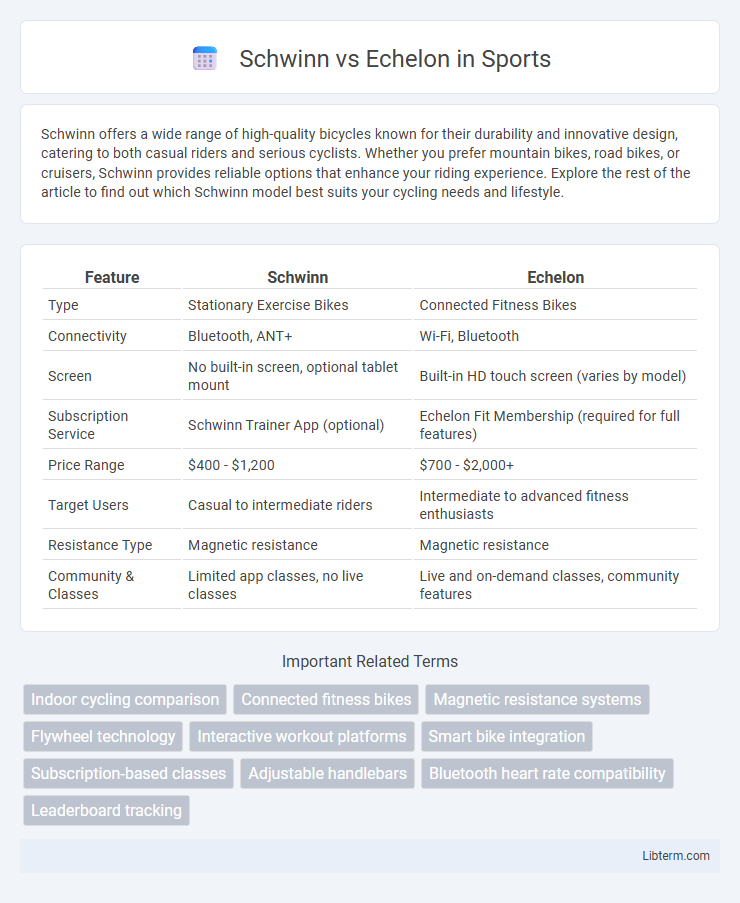Schwinn offers a wide range of high-quality bicycles known for their durability and innovative design, catering to both casual riders and serious cyclists. Whether you prefer mountain bikes, road bikes, or cruisers, Schwinn provides reliable options that enhance your riding experience. Explore the rest of the article to find out which Schwinn model best suits your cycling needs and lifestyle.
Table of Comparison
| Feature | Schwinn | Echelon |
|---|---|---|
| Type | Stationary Exercise Bikes | Connected Fitness Bikes |
| Connectivity | Bluetooth, ANT+ | Wi-Fi, Bluetooth |
| Screen | No built-in screen, optional tablet mount | Built-in HD touch screen (varies by model) |
| Subscription Service | Schwinn Trainer App (optional) | Echelon Fit Membership (required for full features) |
| Price Range | $400 - $1,200 | $700 - $2,000+ |
| Target Users | Casual to intermediate riders | Intermediate to advanced fitness enthusiasts |
| Resistance Type | Magnetic resistance | Magnetic resistance |
| Community & Classes | Limited app classes, no live classes | Live and on-demand classes, community features |
Schwinn vs Echelon: Overview and Brand Background
Schwinn, established in 1895, is a historic American brand renowned for its durable bikes and fitness equipment, including stationary bikes with advanced tracking features. Echelon, founded in 2017, is a newer company specializing in connected fitness bikes with interactive live and on-demand classes, emphasizing community engagement and smart technology integration. Schwinn offers more traditional designs with reliable performance, while Echelon focuses on immersive digital experiences for home workouts.
Key Differences in Bike Types and Models
Schwinn primarily offers a wide range of traditional stationary bikes and hybrid models known for affordability and versatility, while Echelon specializes in high-tech connected indoor bikes with advanced interactive workout features. Schwinn's product line includes upright, recumbent, and exercise bikes catering to various fitness levels, whereas Echelon focuses more on premium spin and smart bikes integrated with live and on-demand classes. The key difference lies in Schwinn's diverse bike types for general home fitness compared to Echelon's emphasis on immersive, tech-driven cycling experiences.
Design and Build Quality Comparison
Schwinn bikes feature a robust steel frame construction paired with ergonomic designs aimed at beginner to intermediate riders, emphasizing durability and comfort. Echelon cycles prioritize a sleek aluminum alloy frame with high-end finishes, delivering a modern aesthetic alongside lightweight but strong build quality. Both brands integrate adjustable components, yet Echelon consistently receives higher ratings for precision engineering and premium materials.
Resistance Mechanisms: Magnetic vs Friction
Schwinn bikes commonly utilize magnetic resistance systems, offering smooth, quiet, and adjustable workouts suitable for various fitness levels. Echelon models also feature magnetic resistance but often incorporate advanced precision controls and quieter motors for enhanced performance. In contrast, friction resistance is less common in these brands, primarily seen in basic models, providing a more traditional but noisier and less consistent workout experience.
Display Consoles and Connectivity Features
Schwinn bikes typically feature backlit LCD consoles that display key metrics such as speed, distance, time, and calories burned, offering Bluetooth compatibility for syncing workout data with popular fitness apps. Echelon models incorporate vibrant touchscreen displays enabling live and on-demand classes, heart rate monitoring, and seamless integration with Echelon's proprietary app for real-time leaderboard and community engagement. Connectivity-wise, Echelon emphasizes interactive experience with Wi-Fi and Bluetooth support, while Schwinn focuses on reliable Bluetooth syncing and external device compatibility.
App Integration and Subscription Services
Schwinn offers the Schwinn Trainer App free with its indoor bikes, providing basic workout tracking and integrated metrics compatible with third-party apps like Zwift. Echelon's app integration is more expansive, featuring live and on-demand classes with interactive leaderboard features and requires a monthly subscription for full access to its comprehensive fitness ecosystem. Subscription services for Echelon include personalized coaching, community engagement, and a wide variety of workout programs, while Schwinn's subscription model centers primarily on enhanced app features and extended class content.
Comfort and Adjustability Factors
Schwinn bikes feature padded seats with multiple adjustment points for personalized comfort during extended rides, accommodating a variety of rider heights and preferences. Echelon models emphasize ergonomic design with cushioned saddles and adjustable handlebars that enhance posture support and reduce strain. Both brands incorporate user-friendly adjustments, but Echelon often offers more precise customization options for optimal riding comfort.
Pricing and Value for Money
Schwinn offers a wide range of indoor bikes with prices typically between $600 and $1,500, providing solid build quality and user-friendly features ideal for budget-conscious fitness enthusiasts. Echelon bikes generally start around $900 and can exceed $2,000, delivering premium streaming class integrations and advanced tech, which appeal to users seeking immersive workout experiences. When comparing pricing and value for money, Schwinn provides more affordable options with reliable performance, while Echelon justifies its higher cost through innovative connectivity and interactive content.
User Experience and Customer Reviews
Schwinn stationary bikes are praised for their sturdy build and affordability, offering smooth rides with intuitive digital displays that enhance user engagement. Echelon bikes receive high marks for their interactive touchscreen technology and comprehensive live streaming classes, providing an immersive workout experience that many users find motivating. Customer reviews frequently highlight Schwinn's reliability and value, while Echelon stands out for superior connectivity and community features that elevate exercise routines.
Which Bike Should You Choose?
Choosing between Schwinn and Echelon bikes depends on budget, features, and workout goals. Schwinn offers affordable, durable models with solid build quality and a variety of resistance levels, ideal for beginners or casual riders. Echelon specializes in connected smart bikes with live and on-demand classes, appealing to users seeking an interactive, tech-enhanced cycling experience.
Schwinn Infographic

 libterm.com
libterm.com